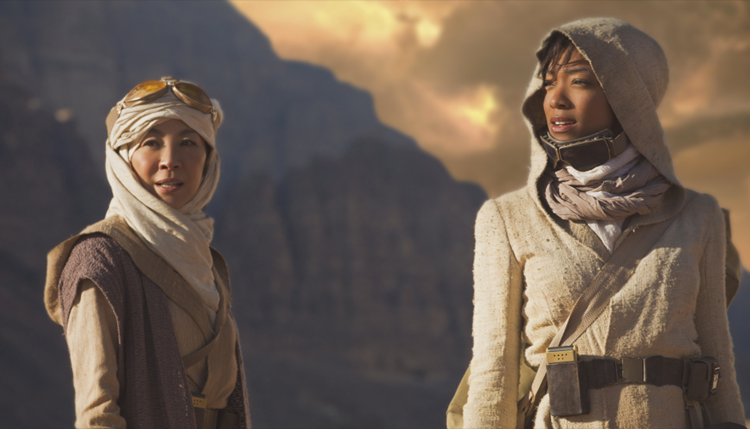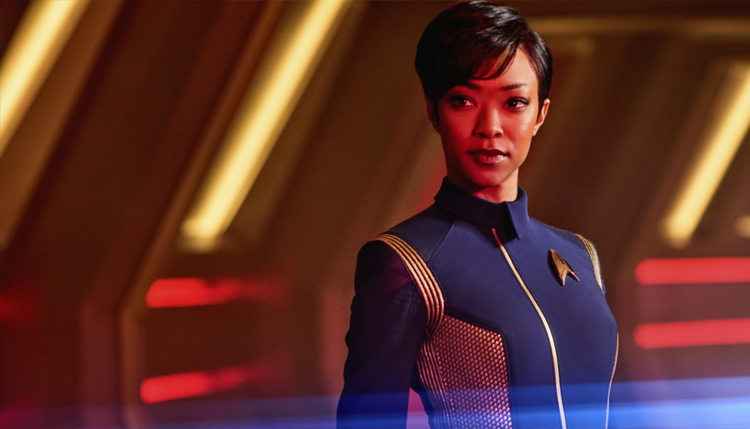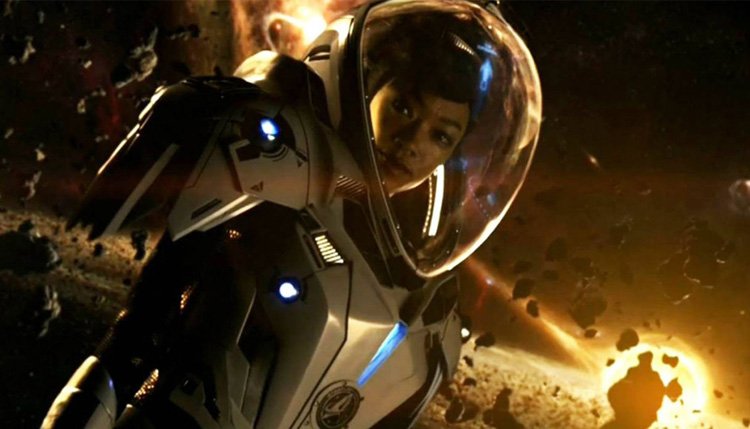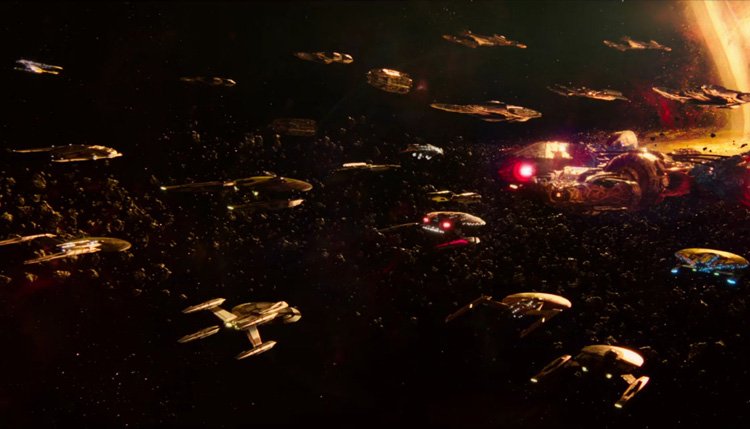Star Trek Rewind: “The Vulcan Hello,” “Battle at the Binary Stars”
“When emotion brings us ghosts from the past, only logic can root us in the present.”
The biggest mistake an ensemble genre franchise can make is to remove the ensemble and replace it with one lone hero. The original series quickly shuffled the players about to and fro giving Spock (and ultimately McCoy) equal time with Kirk in the second and third seasons because they recognized the need for a crew work ethic and collaboration. In Star Trek: The Next Generation, Picard was balanced by the entirety of his bridge crew, and thus more stories could be produced with a wider range of characters and keep the “enterprise” from being dragged into soap-opera mediocrity.
This character strata would continue through to the end of Enterprise in 2005, and was one of the great successes of Star Trek storytelling. Why this format would be abandoned perplexes me. Rather than become invested in a crew and a journey with interesting characters, we are forced, as an audience, to follow the adventures of one Michael Burnham. We knew, going in, the series would seek to rewrite motivations of characters and infrastructure we have known for going on 50 years now in order to fit the mold of a revised narrative.

Star Trek: Discovery takes place at least ten years before the events of the original series and perhaps 90 years after the events of Enterprise. There were bound to be gaps in continuity and “canon.” One of the more jarring realities of genre filmmaking these days is how much more money and time is spent in pursuit of authenticity than was spent 50 years previous. This is obvious in the stunning production design of “The Vulcan Hello,” the first new television episode of Star Trek in 13 years.
For the first time in the television franchise, we feel that we’re on an alien (and utterly inhospitable) world. There are no lights or backdrops. What’s missing in the translation is humility and depth, and real, not manufactured, emotion. Captain Phillipa Georgiou and First Officer Michael Burnham are introduced bringing water to an alien desert. While an impressive, cinematic spectacle, the characters suffer under the constraint of writers determined to depict them as perfect.
This translates into a performance of smug superiority that the show never successfully shakes. It isn’t that these characters are women, and thus the writers are over-compensating with behavioral quirks they assume can be attributed to experience, knowledge, or devotion to duty.
I never had this problem with Janeway, T’Pol, or Saavik. These new characters are wishes. They are not, in any way, written to be realistic. Indeed, Burnham’s ultimate gambit blossoms only from anecdotal propaganda and bad feelings. She has decided to wage war with Klingons by giving them a bloody nose, referencing the title, “The Vulcan Hello.” This is not good.
In point-of-fact, this ridiculous decision ruins the pilot episode, as well as a good portion of the good-will Star Trek: Discovery was hoping to procure. A mysterious yet ornate starship appears and doesn’t respond to hails. Burnham, of course, volunteers to shoot out into space in a jet pack to see what all the hub-bub is about*. Turns out, it’s a Klingon coffin ship, which on its surface, sounds cool. One of their crew confronts Burnham and engages her in battle. She kills the Klingon, and ships begin to amass in a nearby star system.

Starfleet doesn’t want a war, but Burnham believes a pre-emptive strike is their only option. She believes Klingons respect violence, and that respect would lead to peace. Burnham is at odds with her captain, so she gives her a “Vulcan hello.” A neck pinch to knock her out. She takes over the ship and orders full weapons on the Klingon ship. Georgiou comes to and pulls a phaser on Burnham. Did I mention how insane all of this sounds?
Hip deep in a mundane adventure setting, I begin to suspect the producers of Discovery want me to be so transfixed by the visual that I don’t question the narrative, but now that I’ve seen these episodes several times, I can not only question the narrative but the entire premise of the series. Michael Burnham has done something unconscionable in ending a debate with her captain by neck-pinching her, seizing power over the ship from her, hell-bent on a pre-emptive strike against Klingons.
Worse, she thinks she’s braver, smarter, and wiser than her captain and crew by doing this. She’ll either never be proven wrong or dismiss any such claims, so don’t bother. This makes her an incredibly unlikable character from jump-street. She’s a First Officer on a ship on a show written in 2017, and therein lies the disconnect. The original series of Star Trek was written and produced by a majority of armed service veterans. Discovery is Star Trek as interpreted by Liberal Arts majors who spend more time reading comic books than changing diapers.
It’s the wayward charm of the spectacle, the visual beauty, and space opera short-cuts that contribute to the anticlimactic chaos we’re watching. Burnham’s “I can’t let you do this. I’m smarter than you.” logic exists in strict defiance of the chain-of-command, even if you’re convinced your captain’s actions may get you killed. Part of entering the Service is knowing that you may die at any given time in a combat situation.

This leads back to my central problem: the lead as opposed to the ensemble. We know nothing about these characters (and still don’t after two seasons) therefore any dramatic stakes mean nothing. Frankly, I don’t blame Discovery, rather the slavish devotion to story-arc, season-long narrative, and obsession with mutually assured destruction. “Battle at the Binary Stars” picks up where “The Vulcan Hello” left off, which is odd considering the truncated running time.
The two episodes should have been combined into one pilot episode, but then CBS couldn’t corral viewers to their subscription-based CBS All Access service unless they dangled this carrot in front of them. Captain Georgiou relieves Burnham of command and puts her off the bridge. In the middle of all this, we have intrigue with newly redesigned Klingons. They are more alien and more dangerous looking than ever before. There are several different “houses” of Klingon, like tribes each with their own differing interpretations of law, and they argue incessantly while Starfleet forces appear in front of them.
Starfleet (via Georgiou) wants to talk. The Klingons are obsessed with their purity so they open fire on the Starfleet ships. The battle scenes are spectacular but the shaky-cam makes me nauseous. Meanwhile Burham in the brig is still intent on interfering with all of this. A well-aimed laser blast takes out the deck on which the brig is based, so all she sees is a force-field and the stars beyond.
So much of this canon had been re-written to put Burnham in the center of all possible stories. She’s human but was raised as an adopted daughter of Sarek and Amanda (Spock’s parents). She’s been slipped into the action like so much teenybopper fan fiction. The actress, unfortunately, has but one face and one expression and she says everything in the same tone.

In the midst of battle, the Klingons get the drop on an Admiral’s ship and slice it open like a watermelon. It’s quite a cool effect. Klingon leader T’Kuvma is hailed as a messiah. Burnham manages to outwit the ship’s computer (what?) into releasing her from the brig. She goes to the bridge and specifically urges Georgiou not to kill T’Kuvma because his death would make him a martyr. After planting a bomb on a Klingon body and detonating it when it is taken aboard, knocking out the ship’s primary power, Georgiou and Burnham beam aboard the ship where they engage T’Kuvma in combat.
T’Kuvma kills Georgiou and Burnham kills T’Kuvma. I guess she didn’t remember her own warning. Burnham is beamed back and T’Kuvma does indeed become a martyr. Georgiou’s ship is destroyed, and Burnham appears before a court martial where she is stripped of her rank and status, and even then, she can’t stop her lips from flapping. Somewhat poetically, she is sentenced to life imprisonment, but none of this will matter because Michael Burnham is an artificial hero, too perfectly written to either be taken seriously or fail stupendously.
*In order to fully understand and appreciate Star Trek: Discovery, the viewer must surrender to Michael Burnham’s will. For she is the focal point of the show, and as written, a teenage fan’s “slip-in.” A “slip-in” (my words) is a character (preferably female) introduced late in the action (the action of established canon) and slipped in to a story and the roster of established characters with unlimited power, intelligence, and objective beauty. It’s like if I decided to write a character in Star Wars who was Princess Leia’s boyfriend back home on Alderaan who is presumed dead after the Empire destroys the planet, but then he pops up to offer a friendly romantic rivalry with Han Solo. Where did he come from? Michael Burnham is a human female, therefore she is capable of expressing love and an appreciation of her beauty. She was raised as a Vulcan, therefore she is capable of high intelligence, physical prowess, and logic. She was raised not only as a Vulcan, but the adopted daughter of Sarek and Amanda, as well as the adopted sister of Spock so that she may be inserted into the established canon as an undocumented (I hate to use that word) piece of important fiction in the franchise. Michael Burnham is a “slip-in.”

